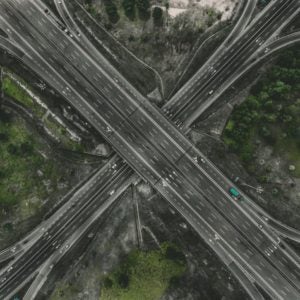As the transport sector evolves, the incorporation of new technologies – autonomous, electric and shared vehicles- will impact the traditional financing mechanisms used for construction and maintenance of transport infrastructure. For instance, the Highway Trust Fund (HTF) in the United States is backed almost entirely from taxes on motor fuels deposited to the Fund. In Latin America and the Caribbean (LAC), similar schemes are in place where fees are charged to the price of gasoline and diesel, and the revenue collected is directly dedicated to maintaining highways.
When looking at the statistics of fiscal revenues in LAC, is observed that taxation of road transport is financially relevant for Governments. Statistics collected for a forthcoming study of the IDB shows that excise duties for gasoline and diesel represented 10.5% of total tax revenue in Costa Rica and 8.2% in Nicaragua for the period 2018. If we consider taxation on vehicle ownership, sales taxes and levies to the purchase and use of motor vehicles, the relevance for the case of Costa Rica rise to 22% of tax revenues and 3% of GDP.
Considering those numbers, it is imperative to start analyzing the potential fiscal impact of disrupting technologies in vehicles fleet -mainly through electrification. According to Deloitte (2018), improving fuel efficiency and vehicle electrification in the United States could reduce revenue from fuel tax from US$36 billion to US$26 billion between 2016 and 2040. For the case of Europe, the OCDE (2019) estimates that total tax revenues from fuel used in passenger cars in Slovenia would drop by 56% between 2017 and 2050 if demand for cars and car use develops as expected.
Incorporation of disruptive technologies in vehicles fleets along with specific concerns about the sustainability of revenue streams from fuel taxes opens the opportunity to rethink medium and long-term options for highway financing.
The key policy question is: How can the tax policy for the road sector adapt to declining fossil fuel use in the long term? Economic science has the answer. On the one hand, the literature suggests that the current scheme of excise duties and carbon taxes on fossil fuels is successful in collecting revenues given the relatively low short-run responsiveness of the tax base (fuel consumption) to prices; indicating that the behavioral response to fuel taxes as a policy instrument to reduce driving, is insignificant in many cases.
On the other hand, instruments such as distance-based or congestion-based schemes could perform better in targeting driving behavior and could be designed such that generate a stable revenue stream when transport decarbonizes. The foundation is an efficient pricing, where governments can charge more for highway use during peak periods to reduce demand when strains on highway capacity are the greatest.
Efficient pricing through instruments that allow targeting the driving-related external cost is one solution, that may reduce congestion and compensate for the income lost; however, it categorically changes the existing methods of doing highway business and puts attention to fossil fuel subsidies, which according to the International Monetary Fund (2019) in most cases remain large.
The study of alternatives for the future of highway financing raises numerous economic, technological, equity and privacy questions.
All of these aspects were addressed during the panel The Future of highway financing in the Americas Transportation Summit 2019. From the panel discussion, thoughts on the key challenges are drawn for the case of the United States. There is a consensus that the main authority’s concern consists in addressing heterogeneity in the transport tax system of the States, therefore, policy instruments must be specific for each case. In view of the panelists, for some States; high occupancy tolling is a feasible option to substitute the declining income, whereas for other States to increase further fuel taxes could be a good solution for the short and medium-term.
Given the uncertainties on technology penetration, much of the panel discussion concerned the timing of when to change the highway financial mechanism to be prepared for when electric cars take over. An additional concern is the administrative cost that supposes a new collection mechanism and the cost-effectiveness for authorities to transition from payment points to an individual or personalized payment.
 Despite the challenges, is clear that the new outlook opens opportunities to use efficient pricing to raise revenues and obtain environmental goals.
Despite the challenges, is clear that the new outlook opens opportunities to use efficient pricing to raise revenues and obtain environmental goals.
As a policy response to the new outlook, certain States in the U.S and many countries in Europe are testing Vehicle Miles Traveled initiatives. Some States have already studied the feasibility of replacing the current system, putting special attention to the use of emerging technologies, such as locational and computing equipment or Intelligent Transportation Systems, that could reduce the cost of charging multiple users.
Multisectoral coordination at all policy levels with a long-term view of the financial planning that incorporates the decarbonization of the sector should be a priority for Authorities. The design and execution of new financial schemes for road infrastructure represents an opportunity to set the prices right and promote the incorporation of technology by creating the incentives to change consumer’s behavior towards public transport and cleaner vehicles. The implications of a comprehensive policy could represent benefits associated with environmental goals such as reduction of congestion and air pollution.
Author invited
AMERICAS TRANSPORTATION SUMMIT

The Americas Transportation Summit was hosted by the Inter-American Development Bank (IDB) in Washington, D.C., with the Ministers of Transportation from Latin America and the Caribbean countries and the United States Secretary of Transportation, Elaine L. Chao.
The Americas Transportation Summit engaged both the public and private sectors in exploring innovative practices to advance competitive, safe, and secure transportation services. The summit gathered high-level government delegations, senior industry stakeholders and academia to debate common transportation challenges in the Americas. Furthermore, it provided a forum for knowledge sharing, fostering different regional cooperation schemes that facilitate the incorporation of innovation and technology in the planning, implementation and operation of transportation services. A forward-thinking approach guided all the discussions, where the interactions of the policy makers with industry and academia experts generated different collaboration synergies to identify effective solutions to the most pressing transportation issues in the region.
The Summit addressed three major challenges of the transport sector:
- evolution of exponential technologies.
- policies to encourage innovation.
- innovative mechanisms to finance infrastructure.



Leave a Reply